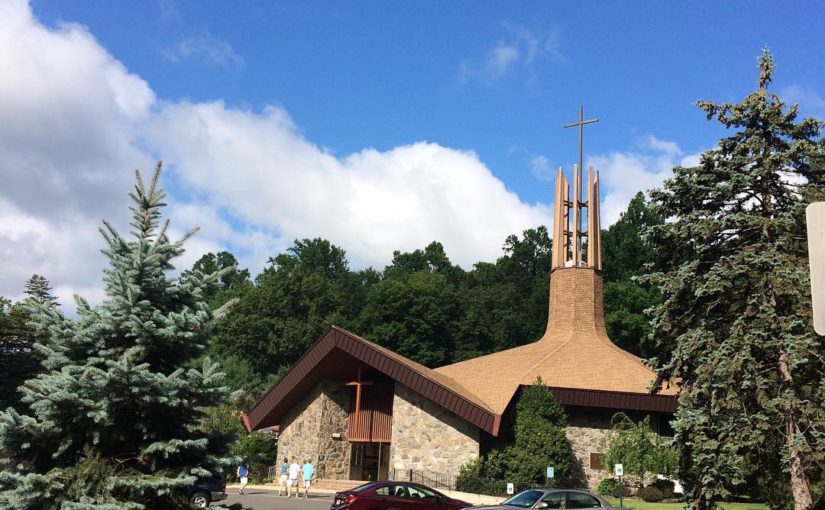When the days drew near for him to be taken up, he set his face to go to Jerusalem. And he sent messengers ahead of him. On their way they entered a village of the Samaritans to make ready for him; but they did not receive him, because his face was set towards Jerusalem. When his disciples James and John saw it, they said, ‘Lord, do you want us to command fire to come down from heaven and consume them?’ But he turned and rebuked them. Then they went on to another village.
As they were going along the road, someone said to him, ‘I will follow you wherever you go.’ And Jesus said to him, ‘Foxes have holes, and birds of the air have nests; but the Son of Man has nowhere to lay his head.’ To another he said, ‘Follow me.’ But he said, ‘Lord, first let me go and bury my father.’ But Jesus said to him, ‘Let the dead bury their own dead; but as for you, go and proclaim the kingdom of God.’ Another said, ‘I will follow you, Lord; but let me first say farewell to those at my home.’ Jesus said to him, ‘No one who puts a hand to the plough and looks back is fit for the kingdom of God.’
Luke 9:51-62
My sermon from the 6th Sunday After Pentecost (June 26, 2016) on Luke 9:51-62. Blessing of the Animals Sunday.
*****
Rev. Marc A. Stutzel at Christ Lutheran Church, Woodcliff Lake, NJ on June 26, 2016
6th Sunday After Pentecost. Luke 9:51-62. We didn’t start the Fire. Blessings of the Animals.
So, I’d like to make a confession to all of you: I would never make it as a Broadway actor. Now I know this not only because I can’t really sing, or dance, or memorize lines. I don’t think I could make it on Broadway because I’m not sure I could handle the rejection. From the actors I know and the stories I’ve read, talent for Broadway is important, but how we handle rejection matters even more. Going into an open audition, with headshots, and resumes, and demo tapes, and all that – that seems doable. But having to do that day in, and day out, and praying that today I would I get that elusive “call-back” for another round of try-outs – that would be hard. To experience that kind of rejection over and over and over again would be soul crushing, frustrating, and exhausting – which is why I sympathize with the reaction the disciples’ had when they experienced rejection in our reading from Luke today. They entered a village of the Samaritans, serving as the advance team to prepare the village for the arrival of Jesus. But when Jesus finally came, the village refused to receive him. They rejected him. The Samaritans see Jesus focused on Jerusalem, so they don’t let him in.
Now, their rejection of Jesus isn’t surprising. Jesus is heading to Jerusalem, the home of the Temple, the center of Jewish worship. Jerusalem for Jesus and the other Jews like him, is where God is; it’s the place God calls home. But the Samaritans disagreed. They believe God is also located at the ancient holy site of Mount Gerzaim. Jesus’ turn towards Jerusalem is a turning away from what the Samaritans believe. So the behavior of the villagers isn’t surprising – but what the disciples want to do, is.
James and John, after spending time and energy to prepare the village for Jesus’ arrival, get mad. They go through the stories they know and they remember something that Elijah the prophet, once did. Soldiers from the old Northern Kingdom of Israel, the area that became Samaria, tried to force Elijah to visit the king. The soldiers were from the wrong part of town, worshiped God the wrong way, and they had the gall to assume they could get a prophet of God to do what they want. So Elijah burned them up. Jesus’ disciples, trying to make sense of why the Samaritans would not receive Jesus, twist bits of this old story to give meaning behind what they are experiencing now. James and John asks Jesus to embrace their anger and do what Elijah did.
But Jesus says no.
Which is a really great response. This is the Jesus we like to preach and share – the Jesus who doesn’t rain fire and brimstone on those who reject him and who doesn’t encourage violence as a response to difference or disagreement. This Jesus – isn’t a Jesus that the church has always followed. In our long and bloody history, we’re too often like James and John when it comes to engaging with people who don’t believe like we do. And I’m not sure the church has repented enough when it comes to the violence we’ve inflicted and caused. Jesus tells his disciples that our job isn’t to seek and destroy. We’re called, instead, to save and heal.
But what does that healing look like? Well, not raining fire from above on people and communities we don’t like or agree with is probably a start. We also need to work hard so our feelings of rejection don’t cause us to reject others too. But there’s more to following Jesus than just being kind. After Jesus rebuked James and John, their journey towards Jerusalem causes them to run into 3 unnamed people who want to follow Jesus. And Jesus…well…what he says is harsher than what’s come before. One person makes a promise that they will follow Jesus but Jesus makes clear that this journey is not a comfortable one. The journey to Jerusalem doesn’t include the comforts, security, and protection of home. Another follower comes but first wants to bury their father. Jesus tells him that the journey to Jerusalem trumps family loyalty and responsibility. Finally a third comes willing to follow Jesus, but before he goes, he wants to tell his family goodbye. Jesus, again, says “no.” None of these three followers say anything unreasonable. None of them say anything wrong. But Jesus’ rebuke to each of them is harsh. His sayings are strong and they sting because, in the words of Mother Mitties DeChaplain, Jesus “simply refuses to blunt the sharply pointed reality that to share in the work of Jesus is to share in his sacrifice.” Jesus’ face is set to Jerusalem. Jesus knows where he’s going. He knows that following him isn’t about being comfortable. The journey to Jerusalem involves a cross.
When it comes to rejection – Jesus’ words seem to be rejecting those who can’t fully commit to him. And For those of us already on the inside, who already feel comfortable in our faith, Jesus’ words appear like a pat on the back. We’re already following Jesus – so that must mean we’ve got something others don’t. In the text today, Jesus seems to be holding some kind of audition for those who want to be on his side. But even in this audition-like atmosphere, where these three followers offer their best monologue on why they should star in Jesus’ play, not one of them actually leaves. Their words are rejected – but the text doesn’t say that these followers were cast away from his side. Jesus doesn’t say these harsh words, trying to reject some who wish to follow him. Instead, he’s sharing what being a follower of Jesus looks like. Being a disciple isn’t easy. Being a disciple is more than just being kind. Following Jesus involves a dying – a dying of all our impulses and sin that make us see the world differently than God sees it. The differences we have with each other, the boundaries we define to decide who is in, who is out, and who should be rejected, is not part of God’s agenda, nor does it have a place in God’s kingdom. What God values is what Jesus is about to do and it involves a lot of “self-sacrifice, self-giving, [and] self-forgetfulness.” Being a follower of Jesus means we will be uncomfortable and we will end up in places and with people who we don’t understand and who don’t understand us. But the call to love is bigger than our call to reject because being a disciple involves a cross – a cross that we take up daily because Jesus took up his cross for all.
Amen.
Podcast: Play in new window | Download


